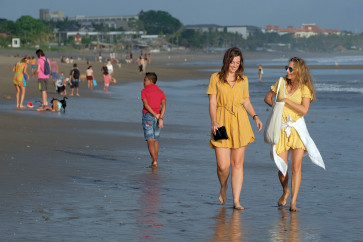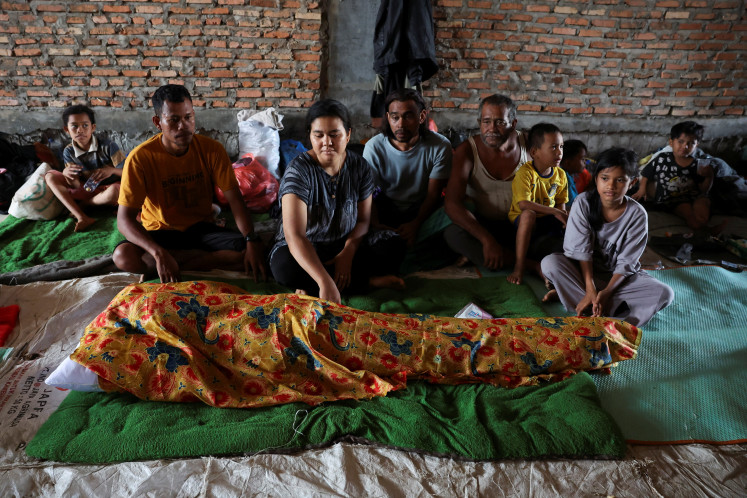Popular Reads
Top Results
Can't find what you're looking for?
View all search resultsPopular Reads
Top Results
Can't find what you're looking for?
View all search resultsUlema Council to ban Muslims from LGBT advocacy
Following the recent controversy over LGBT groups on university campuses, an ulema group has paved the way for banning all activities that advocate freedom of sexual orientation
Change text size
Gift Premium Articles
to Anyone
F
ollowing the recent controversy over LGBT groups on university campuses, an ulema group has paved the way for banning all activities that advocate freedom of sexual orientation.
The Indonesian Ulema Council (MUI) has confirmed that it is currently preparing a fatwa, or a non-legally binding edict, that will recommend the prosecution of Muslims who join in LGBT-related activities.
MUI chairman Ma'ruf Amin told The Jakarta Post the government-sanctioned body was preparing the fatwa and was soon to announce it.
Ma'ruf said that as the MUI had earlier issued a fatwa declaring LGBT communities 'religiously, culturally and morally deviant', through this fatwa it was looking to ban Muslims from joining any groups promoting LGBT rights in Indonesia, a country with a majority Muslim population.
'We want Muslims to be cautious of LGBT [activities]. This is not about LGBT people, but more to do with their movements. There is a lot that is deviant about it,' Ma'ruf said recently, adding that the fatwa was an effective way of reminding Muslims about the 'danger' of LGBT movements, which he noted had increased in recent years in Indonesia.
Ma'ruf said that the fatwa would also seek a ban on LGBT groups in Indonesia.
LGBT activities on campus came into the spotlight recently when conservative media coverage attacked the Support Group and Resource Center on Sexuality Studies (SGRC) at the University of Indonesia (UI), triggering hostile remarks from public officials including Research, Technology and Higher Education Minister Muhammad Nasir and Education and Culture Minister Anies Baswedan.
The hostility was exacerbated by a tough stance against LGBT rights from the country's largest Islamic organization, Nahdlatul Ulama (NU) ' known for its moderate stance on minority issues ' as well as from the traditionally inclusive National Awakening Party (PKB).
MUI edict commission secretary Asrorun Niam said that LGBT activity was a deviant way to channel sexual desire and if spread widely in society it could disrupt 'legal and social' order.
He said that the MUI was also looking to recommend that the government include articles that provided legal basis for charging people who enjoyed such 'deviant sexual activity', adding that human rights in Indonesia should comply with religious and moral values.
Asrorun called on Muslims across the country not to discriminate against LGBT people, whom he said 'should be rehabilitated to cure their homosexuality'.
'For those who campaign for [LGBT rights], there should be firm legal prosecution to protect the legal and social order of society,' he said.
Setara Institute deputy chairman Bonar Tigor Naipospos called on the government to reject the MUI's call to ban LGBT groups in Indonesia, saying a fatwa could not be used a basis to make a law or regulation.
'In the process of making a law, lawmakers should not only consider the views of religious groups but also [...] members of the public. Indonesia has strong influences from religious groups, thus, it is difficult to expect the state to legitimize LGBT [expression], but it does not mean that the government should not give LGBT people the same treatment as other citizens,' Bonar said.
Amid the controversy, organizers have postponed a Valentine's Day 'G Nite Party' in Surabaya, East Java, citing lack of a security guarantee or protection from law enforcement agencies.
'We eventually postponed the event, scheduled for Feb. 7 at one of the karaoke parlors in the Maj. Gen Sungkono area, after police were unable to provide security to revelers,' GAYa Nusantara board member Dede Oetomo told the Post on Sunday.
Dede said that after the police questioned them on their event licensing, the organizing committee immediately consulted with the Surabaya City Police.
'The police did not ban the event, but they could not guarantee [our security] if we were attacked by religious groups. In the event of an attack, police could also not blame the [attackers] because the lesbian, gay, bisexual and transsexual (LGBT) community has not been recognized in Indonesia,' said Dede.
Surabaya Police spokesman Comr. Lily Djafar said police would call off the G Night Party event on the grounds it did not have a police permit.
'Any activities involving a crowd must have permission from the police ' without one they are regarded as illegal. If the event were to be held, we would take action in accordance with applicable laws,' said Lily.
She added that if the organizers applied for a permit, police could not immediately issue it because in general, police only issued permit for events that did not disturb public order.
____________________________________________
To receive comprehensive and earlier access to The Jakarta Post print edition, please subscribe to our epaper through iOS' iTunes, Android's Google Play, Blackberry World or Microsoft's Windows Store. Subscription includes free daily editions of The Nation, The Star Malaysia, the Philippine Daily Inquirer and Asia News.
For print subscription, please contact our call center at (+6221) 5360014 or subscription@thejakartapost.com










